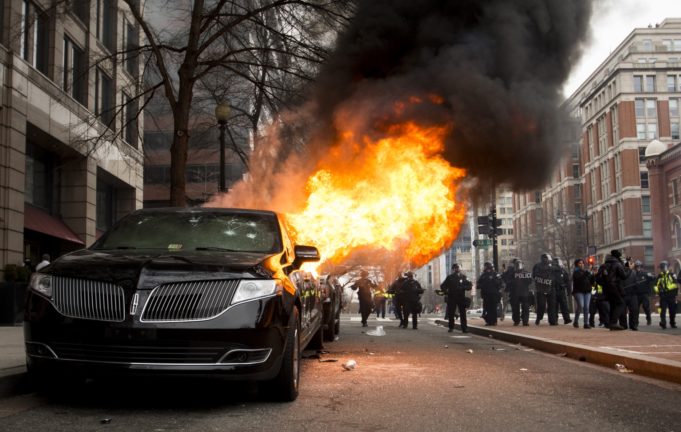Dozens of defendants, each sitting with their own lawyers, fill a courtroom in Washington, D.C., looking like college students wearing their nicest clothes for a job interview. It is far more serious than that. They are all facing charges of felony rioting, conspiracy to riot, and destruction of property from the morning of Donald Trump’s inauguration, when they were scooped up en masse by police with a controversial crowd-control technique in which protestors are corralled in a “kettle.”
This is only one of the four groups among the 215 defendants who have been indicted on nearly identical charges. Many had to travel back to the District to be arraigned today, June 9.
One man who traveled from Santa Fe is sitting with his lawyer off to the side. He wears a black suit and has a black goatee and identifies himself as Tejano. He looks around the room like he is taking notes. Everyone else has already been arraigned before Judge Lynn Leibovitz. But this man, Aaron Cantú, wasn’t indicted until May 30, just a week before the hearing. He is a journalist who has written about policing, propaganda, drugs, and politics for The Intercept, Al Jazeera, The Baffler, and many other publications. Reporting from the RNC on the possibility of a Trump presidency, Cantú wrote, “dream darker.”
Now, like the others being charged, he’s facing 70 years in jail.
As various protests spread through the city on the morning of the inauguration, one group used “black bloc” techniques — wearing all black and acting in concert to attack symbols of multinational capitalism in a semi-anonymous fashion — in an attempt to disrupt the spectacle of the event, breaking windows of businesses like Starbucks and Bank of America.
“Individuals participating in the Black Bloc broke the windows of a limousine parked on the north side of K Street NW and assaulted the limousine driver as he stood near the vehicle,” the indictment reads, “as Aaron Cantu and others moved west on K Street NW.”
These black blocs have received widespread media attention in America since 1999, beginning with the Battle of Seattle at the World Trade Organization summit. A black bloc action is newsworthy. And yet, according to the indictment, Cantú is being charged for moving in proximity to the group he was covering.
The indictment alleges that Cantú wore black and discarded a backpack as further evidence of his part in the conspiracy. Because members of a conspiracy to riot wore black, anyone wearing black, it seems, is a member of the conspiracy.
It is a crazy, complicated, sprawling case involving evidence from somewhere around 200 cell phones and various cameras. The discovery process will take months.
In Washington, D.C., criminal cases that elsewhere would be handled by the state are prosecuted by the U.S. Attorney’s office — so each prosecutor here ultimately answers to the president of the United States. Although the charges were first brought by an Obama appointee, this is a perfect example of what justice may look like in the Trump era. Like the travel ban, it is a grand draconian gesture followed by a lot of confusion.
During the arraignment, prosecutor Jennifer Kerkhoff expressed concerns about finding herself in a “Brady trick bag,” referring to the law that requires the prosecution to turn over all relevant evidence in discovery. How does she know what material on someone else’s phone might be relevant to another’s case? And how does the prosecution protect the privacy of co-defendants with data that are not relevant?
“Can I just stop you?” Judge Leibovitz says to Kerkhoff as she talks about efficiency. “You brought charges against 215 people.”
She does not have to finish. Her look says “deal with it.”
Leibovitz set most of the trial dates for October 2018, so that all evidence can be properly dealt with.
“It’s concerning and confusing,” says Christopher Gowen, an American University law professor and partner at his own firm who was appointed to the case. “The fact that we are already here and the amount of resources being spent to get to where we are now leads me to believe we are going to have to sit through all these trials. All this taxpayer money is going to be wasted.”
Gowen says that his client, Cabal Bhatt, was charged on the basis of wearing a bandana on his face to protect from police pepper spray.
As the name of each defendant is called — Cantú and his co-defendants all plead not guilty — I think about how I was almost arrested reporting on the same events that day. I watched as the black bloc came around the corner, flanked by police. Trashcans rolled through the street. Pepper spray came out. An officer ran at me with her stick. I held up the media credentials hanging around my neck and yelled, “Press!” She went around me. I was lucky.
At the advice of his lawyers, Cantú isn’t talking to me or any other journalist. I ask Julie Ann Grimm, his editor at the Santa Fe Reporter, which hired him in April, if the impending charges make her more reluctant to assign him to certain stories.
“His arrest was scary, the threat of being imprisoned for the rest of your life for just doing your job and observing a protest is … I don’t even know how to finish that sentence,” she says over the phone. “I think Aaron is nervous about covering protests. I’m slightly nervous about sending him out to them. But we’re really not going to let this action by the federal government or by the prosecutors in Washington, D.C. slow him down or to put a muzzle on his voice as a journalist.”
Still, she says, he might do a couple things differently now. “He will probably try to stay very separate from the people who are a part of the news event, and he will probably wear something like a tie.”
But Grimm is quick to stress that Cantú is not the only one in this case whose rights are being violated.
“We’re all standing up for Aaron, and this affects our industry and our identity as journalists,” Grimm says. “But the larger sort of corralling, the kettling, the mass-arresting is also troubling.”
From the RNC, Cantu wrote, “Imagining the worst possible future your mind can conjure is an essential step to avoiding a world you do not want to live in. Things are bad, very bad, and we will fuck them up even worse if we can’t acknowledge how very bad they are.”
Democracy in Crisis is a syndicated column from Washington, D.C.












